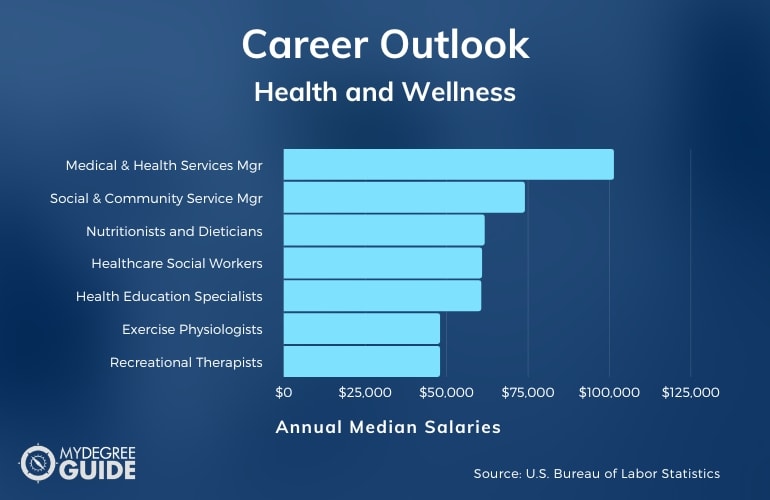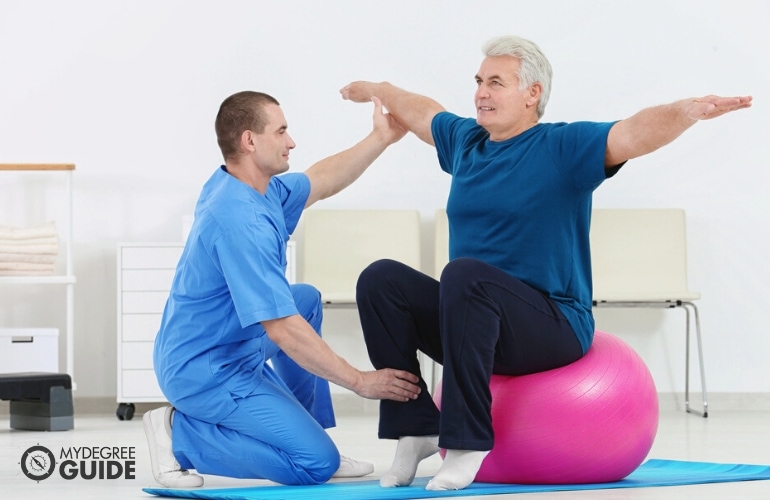You might be interested in exploring health and wellness degrees if you’re looking for a career path that helps empower individuals and communities to live healthier lives.

A health and wellness major could provide you with a broad knowledge of subject matter related to health in order to prepare you for diverse career opportunities in the wellness field.
Editorial Listing ShortCode:
Whether you’re interested in nutrition, fitness, disease prevention, or health psychology, this degree could help set you on the path toward a career in the health sphere.
Universities Offering Online Bachelor in Health and Wellness Degree Programs
Methodology: The following school list is in alphabetical order. To be included, a college or university must be regionally accredited and offer degree programs online or in a hybrid format.
Abilene Christian University
Abilene Christian University offers an online program for a BS in Health and Human Performance. ACU seeks to provide a Christ-centered community and teach a holistic approach to health and fitness. The curriculum is designed to prepare students for entry-level positions in the fitness industry or for graduate school.
Abilene Christian University is accredited by the Southern Association of Colleges and Schools Commission on Colleges.
Arizona State University
Arizona State University offers a Bachelor of Science in Health Sciences with a concentration in Healthy Lifestyles and Fitness Science. Each course is 7.5 weeks long. Potential courses include Introduction to Evidence-Based Research in Nutrition, Complementary Health Care, and Health Coaching Concepts and Skills.
ASU is accredited by the Higher Learning Commission.
Asbury University
Asbury University offers a Bachelor’s in Health Promotion and Wellness that can be earned online. Each class is 8 weeks long, and there are 5 start dates offered each year. Potential courses include Scientific and Medical Terminology, Community and Environmental Health, and Introduction to Public and Population Health. All of Asbury’s classes teach from a Christian worldview.
Asbury University is accredited by the Southern Association of Colleges and Schools Commission on Colleges.
Eastern Oregon University
Eastern Oregon University offers a BS and a BA in Human Health and Performance. Concentration options include Nature and Outdoor Recreation Programming, Community Health, Exercise Science, and Physical Education and Sport. All these options are available 100% online, and students may participate in internships locally.
Eastern Oregon University is accredited by the Northwest Commission on Colleges and Universities.
Excelsior University
Excelsior University offers a BS in Health Sciences with an emphasis in Health and Wellness that can be earned online. Potential courses include Health Care Issues in Culturally Diverse Populations, Research Methods, and Introduction to Healthcare Informatics. The program culminates with a capstone course that focuses on practical applications.
Excelsior University is accredited by the Middle States Commission on Higher Education.
Keuka College
Keuka College offers a Bachelor’s in Community Health and Wellness designed for busy adults. Classes are available in the evenings and online, and they meet just once a week. Potential courses include Building a Culture of Health, Theoretical Principles of Health Behavior, and Statistics for Social Science.
Keuka College is accredited by the Middle States Commission on Higher Education.
New York Institute of Technology
The New York Institute of Technology’s Health and Wellness BS program uses a blend of online and in-person instruction. The curriculum is designed to teach theoretical knowledge and practical skills, and all students are required to complete a semester-long internship during their senior year. The student-to-faculty ratio is just 11-to-1 to help students receive personalized mentorship.
The New York Institute of Technology is accredited by the Middle States Commission on Higher Education.
Ohio State University
Ohio State University offers an online program for a Bachelor of Science in Health and Wellness. Some of Ohio State’s online classes are synchronous, and others are asynchronous. The program is offered by the College of Nursing and includes lab and practicum experiences. Graduates are eligible to pursue several different professional certifications in the field of health promotion.
Ohio State University is accredited by the Higher Learning Commission.
Pennsylvania Western University
Pennsylvania Western University offers an online program for a BS in Exercise Science. The program is designed to help students gain Certified Personal Trainer or Certified Speed Coach certification. The curriculum teaches not only about health and fitness but also about business and marketing. There are no on-campus requirements.
PennWest is accredited by the Middle States Commission on Higher Education.
Purdue University
Purdue University offers an online program for a Bachelor of Science in Health and Wellness. Each course is 10 weeks long. Students typically need to devote 15 to 18 hours to their studies each week. The program offers opportunities to participate in internships and is customizable through elective options.
Purdue University is accredited by the Higher Learning Commission.
Rasmussen University
Rasmussen University offers an online program for a Bachelor’s in Health and Wellness. The program is designed to provide scheduling flexibility for working adults, and the accelerated track allows students to get a head start on their master’s degree. Online students at Rasmussen have access to campus support and resources.
Rasmussen University is accredited by the Higher Learning Commission.
State University of New York – Oswego
The State University of New York—Oswego offers a Bachelor of Science in Wellness Management. Students in the program can receive a broad liberal arts education, take coursework covering health and human behavior, and gain real-world experience through an internship. An online degree completion program is available for those who already have sufficient college credit.
SUNY Oswego is accredited by the Middle States Commission on Higher Education.
Thomas Edison State University
Thomas Edison State University offers a Bachelor of Arts in Liberal Studies with a concentration in Health and Wellness. Potential courses include The Science of Nutrition, Men’s Health, Women’s Health, Biological Aspects of Aging, Kinesiology, and Biomechanics of Exercise.
Thomas Edison State University is accredited by the Middle States Commission on Higher Education.
Tulane University
Tulane University’s Bachelor of Arts in Health and Wellness can be earned on campus or in a combination of online and on-campus classes. Students can work at their own pace and choose from multiple campus locations. Class sizes are small, and the program’s instructors have real-world experience.
Tulane University is accredited by the Southern Association of Colleges and Schools Commission on Colleges.
University of Arizona
The University of Arizona offers a Bachelor of Arts in Wellness and Health Promotion Practice with a Health and Wellness track. The program is available both in person and online. Potential courses include Biology in Public Health, Corporate Wellness, and Public Health Nutrition. Students also have practicum and internship opportunities.
The University of Arizona is accredited by the Higher Learning Commission.
University of Louisiana – Lafayette
The University of Louisiana—Lafayette offers a BS in Kinesiology with a concentration in Health Promotion and Wellness. Courses are 100% online and use either a 16 week or an accelerated 8 week format. The curriculum is designed to prepare students for the Certified Health Education Specialist exam.
The University of Louisiana at Lafayette is accredited by the Southern Association of Colleges and Schools Commission on Colleges.
University of Missouri
The University of Missouri offers a Bachelor of Health Science in an online format geared toward working professionals. Students have internship opportunities and are expected to apply their learning in a hands-on capstone project. The curriculum is designed to prepare students for a range of non-clinical roles in healthcare or for attending graduate and professional programs.
The University of Missouri is accredited by the Higher Learning Commission.
University of Wisconsin – River Falls
The University of Wisconsin–River Falls offers a BS in Health and Wellness Management. This is a degree completion program for those who already hold a related associate degree. It is fully online, with no campus visits. UW’s online classes allow students to connect with classmates via discussion boards and video conferencing.
The University of Wisconsin – River Falls is accredited by the Higher Learning Commission.
Walden University
Walden University offers an online BS in Health Studies with a concentration in Health Promotion and Wellness. The program is designed to prepare students for the Certified Health Education Specialist exam. Students can choose between either self-paced courses or courses that provide a structured schedule.
Walden is accredited by the Higher Learning Commission.
Winona State University
Winona State University offers an online, part-time bachelor’s degree completion program in health and wellness management. The curriculum is designed to help students become certified health coaches. New students can start in the fall, spring, or summer, and the program can usually be finished in 6 semesters. Winona State’s online courses are asynchronous.
Winona State University is accredited by the Higher Learning Commission.
Online Health and Wellness Degrees

Many students looking to pursue a health career outside of the traditional patient-care settings choose to earn a health and wellness degree.
The overarching focus of health and wellness degree programs is to equip you with the knowledge and skill sets to help individuals and communities live healthier lives. This is why many programs cover a diverse range of health and wellness topics, such as:
- Health and fitness
- Disease prevention
- Behavioral issues
- Nutrition
You can also be exposed to research methods that help you evaluate research in nutrition, exercise, stress management, health psychology, and complementary medicine.
A bachelors program in health and wellness also covers major concepts and theories across several health and wellness domains, including:
- Exercise and nutrition science
- Alternative medicine
- Psychology
- Health promotion
- Integrative and alternative medicine
You’ll learn strategies for designing health programs for these domains as well. Many programs also explore global health issues and policies, including how economics and geopolitics affect nutrition and access to health measures.
Overall, this degree provides foundational competencies in health and wellness that may lead to careers in public health, health coaching, community health, and more. It may also serve as a base for continuing education in leadership fields in health and healthcare.
Students who want to become medical practitioners can go on to complete medical school or to earn their masters in a clinical field.
Health and Wellness Careers & Salaries

The broad and comprehensive health knowledge provided in health and wellness degree programs can help prepare graduates for a variety of career paths.
Graduates choose to be involved in public health, where they could help design and implement health programs within communities. Others choose to work in communities as community health workers, where they may help marginalized groups have access to health services.
Becoming a health or wellness coach is another avenue that some graduates pursue. They may help clients improve their lifestyle through altering their nutrition intake, mindset, fitness routine, or a combination of these. According to the Bureau of Labor Statistics, here are the median salaries of potential career paths related to health and wellness.
| Careers | Annual Median Salaries |
| Medical and Health Services Managers | $101,340 |
| Social and Community Service Managers | $74,000 |
| Nutritionists and Dieticians | $61,650 |
| Healthcare Social Workers | $60,840 |
| Health Education Specialists | $60,600 |
| Exercise Physiologists | $47,940 |
| Recreational Therapists | $47,940 |
| Community Health Workers | $46,590 |
| Fitness Trainers and Instructors | $40,700 |
| Social and Human Service Assistants | $37,610 |
Professionals with a bachelors in health and wellness online degree may be found in medical offices, corporate wellness centers, university health services, fitness centers, pharmaceutical companies, community centers, and more. This degree path can also serve as a foundation for graduates looking to further their studies in health administration or a clinical profession.
Employment of healthcare occupations overall is expected to grow by 13% over the next ten years (Bureau of Labor Statistics). This is considered faster than the average for all occupations.
Health and Wellness Bachelor’s Curriculum & Courses

Health and wellness degree programs can have varied curriculums, but many core courses are similar. You may encounter courses similar to the following:
- Complementary and Integrative Medicine: This course dives into the theories and capacities of complementary and integrative medicine practices, and it also explores the multifaceted meanings behind the term “holistic.”
- Contemporary Diet and Nutrition: This course overviews current dietary trends, geopolitical impacts on food and nutrition, genetic engineering, foodborne illnesses, and more.
- Models for Health and Wellness: This course investigates the influences of religion, philosophy, science, and psychology on health, healing, and wellness in the modern era and throughout history.
- Current Trends in Exercise and Fitness: This course overviews the current trends and challenges in health and wellness across age groups, and it also teaches you how to design and tailor health and wellness plans to various age groups.
- Stress: Critical Issues in Management and Prevention: This course investigates research and approaches to identify, manage, and prevent stress.
- Health and Wellness Programming: Design and Administration: This course overviews the strategies and components useful in designing effective health and wellness programming.
- Psychological and Spiritual Aspects of Healing: This course overviews concepts and practices related to mindset in the healing process, such as meditation, transpersonal psychology, and mindfulness.
- Anatomy and Physiology: This course dives into the anatomical structure of the human body, alongside physiological processes.
- Epidemiology: This course overviews concepts relating to infectious disease transmission and prevention from a global standpoint.
- Wellness Coaching Theory and Practice: In this course, you’ll learn behavioral strategies for implementing positive, healthy behavior change in individuals.
The coursework for this degree path centers on furthering your knowledge of physical and psychological health.
Online Degree in Health and Wellness Admissions Requirements

Admissions for health and wellness degrees online tend to vary depending on the school, but many have similar core requirements. Here are a few of the common admissions essentials:
- High school diploma or GRE equivalent
- Minimum GPA of 2.5, on average
- Letters of recommendation
- SAT or ACT scores (only some schools require them)
A growing number of schools no longer require SAT or ACT scores for admissions. You can contact your prospective school’s admissions office with any questions you may have about their admissions requirements and the overall application process.
Degrees in Health and Wellness Accreditation

Determining whether your potential school or university is accredited is an important step to take before you apply.
Accreditation is essentially quality assurance that your university meets certain professional education standards. These accreditation standards could affect the credibility of your degree. This, in turn, could impact your employability in the future as well as your ability to receive financial aid.
Regional accreditation is considered the most prestigious and widely recognized accreditation. You can visit the website of the Council for Higher Education Accreditation (CHEA) to verify your school’s accreditation status.
Financial Aid and Scholarships

Many students seek financial assistance to help cover the upfront costs of a BA in Health and Wellness degree program. Fortunately, there are many types of aid options available to students who qualify, including federal aid, state aid, scholarships, grants, and more.
Quite a few scholarships and grants exist for students across the country depending on their need, location, and type of study. Looking into grant options alongside loans can help minimize overall tuition costs. If you do need the help of loans, both federal and state student loan options may be available. Government aid can come in the forms of grants and work-study programs as well.
To determine your eligibility for need-based aid, you can fill out the Free Application for Federal Student Aid (FAFSA). Some employers may also offer financial aid programs to help their workers complete their college education.
What Is a Health and Wellness Degree?

A health and wellness degree is designed to provide you with varied knowledge regarding health and wellness. Your studies will likely include preventative health measures like nutrition, fitness, disease prevention, mindset, psychological and spiritual wellness, and more.
This degree path emphasizes industry wellness knowledge and prepares graduates to professionally improve the lives of others through program design and coaching methods. This type of program can also cover topics such as stress, anxiety, global health, epidemiology, economics, and public and healthcare policy.
What Can You Do with a Health and Wellness Degree?

A health and wellness degree could lead to a variety of career paths. Some programs offer concentrations that allow you to focus on a certain specialty area. For instance, those interested in becoming nutritionists may focus on nutrition science.
Graduates may decide to pursue careers in public health, where they can help design health programs for entire communities to promote health and disease prevention. Health education specialists and community health workers can also work for a variety of industries. Some become health coaches for individuals or corporate wellness coordinators for businesses.
Depending on experience, this degree may also provide a base for wellness administrative positions in various healthcare and community settings.
How Long Does It Take to Get a Bachelor in Health and Wellness Degree Online?

Generally, if you attend full-time and follow a traditional 16 week semester, it takes 4 years to complete a bachelors degree program.
If you instead follow an 8 week semester and stay continuously enrolled year-round, even during the summer time, you may be able to finish in less time. Some universities offer accelerated bachelors into masters degree paths. You might consider this option if you’re looking to continue your education beyond a bachelors degree.
Is a Health and Wellness Degree Worth It?

Yes, a health and wellness degree is worth it for many students. Because this degree covers such a diverse landscape of health and wellness topics, graduates may also be open to a variety of careers in the industry.
Some graduates decide to pursue careers in the public or private health sector, where they may design nutrition or lifestyle programs. Others may become wellness coaches or coordinators for individuals or companies. According to the Bureau of Labor Statistics, health education specialists and community health workers are expected to see 12% job growth over the next ten years, which is much faster than average.
Getting Your Bachelor Degree in Health and Wellness Online

Earning a bachelors in health and wellness online could allow you to build a broad knowledge base in this in-demand field.
The varied and comprehensive subject matter in this type of health services degree online program can help prepare graduates for a variety of career opportunities in different health sectors. Some professionals in this field work to create health programs to promote community health, while others work directly with individuals to improve their nutritional habits or fitness routines.
Many programs offer electives or concentrations that allow you to focus on the areas within health and wellness that most interest you. Why not start exploring health and wellness degree programs from accredited schools today?
